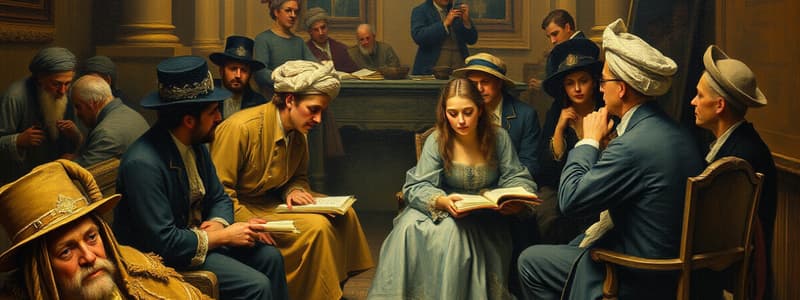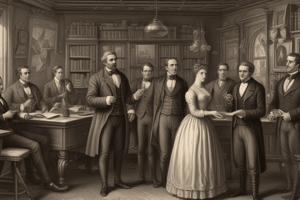Podcast
Questions and Answers
How can you identify social class? (Select all that apply)
How can you identify social class? (Select all that apply)
- Their leisure activities (correct)
- Their car ownership (correct)
- Their social status (correct)
- Their level of education (correct)
- Their type of housing (correct)
How does occupation affect social class?
How does occupation affect social class?
Occupation often forms a central part of individual identity and is linked to how people define themselves and are defined by others.
What are some social class differences?
What are some social class differences?
Higher social classes have better housing, cars, food, holidays, incomes, and job security.
What is objective?
What is objective?
What is subjective?
What is subjective?
What is a habitus?
What is a habitus?
What did Bourdieu say about class habitus?
What did Bourdieu say about class habitus?
What is cultural capital?
What is cultural capital?
What is meritocracy?
What is meritocracy?
What do functionalists think about meritocracy?
What do functionalists think about meritocracy?
What do Marxists think about meritocracy?
What do Marxists think about meritocracy?
What did Waldfogel and Washbrook say about children from disadvantaged backgrounds?
What did Waldfogel and Washbrook say about children from disadvantaged backgrounds?
How do lower-class children compare to middle-class children?
How do lower-class children compare to middle-class children?
Flashcards are hidden until you start studying
Study Notes
Identifying Social Class
- Social class can be identified through power, influence, education level, social status, housing type, car ownership, leisure activities, and lifestyle choices.
Occupation and Social Class
- Occupation significantly influences individual identity and social identity; it's often the first trait recognized about a person.
Social Class Differences
- Higher social classes enjoy better housing, food, vacations, incomes, and job security.
- Wealth distribution in Britain:
- 10% of households own 44% of the wealth.
- 20% own approximately 63%.
- The bottom 50% hold only about 9%.
- The top 20% of earners receive over seven times more than the bottom 20%.
- Roughly 20% of the population lives in relative poverty.
Objective vs. Subjective Class
- Objective measures focus on material differences in life chances, independent of personal perceptions.
- Subjective measures refer to personal perceptions of class identity, influenced by attitudes, beliefs, values, and cultural choices.
Habitus
- Habitus refers to the cultural framework and set of ideas cultivated within a social class, primarily through family socialization.
Bourdieu's Class Habitus
- Bourdieu posits that each social class has its own habitus, which influences:
- Knowledge and language use.
- Manners and behavior.
- Cultural tastes and lifestyle choices.
- The dominant class's view of taste often shapes societal standards, with 'cultural capital' being the familiarity with the dominant class habits.
Cultural Capital
- Cultural capital is the collection of knowledge, language, skills, attitudes, and social networks predominantly held by upper and upper-middle classes.
Meritocracy
- A meritocracy is a system where success is based on talent, abilities, and effort; in Britain, educational success is expected to correlate with future employment success.
Functionalist Perspective on Meritocracy
- Functionalists like Talcott Parsons argue that meritocracy can create social inequality due to unequal opportunities in education based on class, gender, and ethnicity.
Marxist Perspective on Meritocracy
- Marxists contend that evidence shows Britain is not truly meritocratic, as a weak correlation exists between education levels and pay, maintaining inequalities.
Disadvantaged Backgrounds
- Research by Waldfogel and Washbrook indicates that children from disadvantaged backgrounds may be up to a year behind their more privileged peers academically by age three, before starting school.
Studying That Suits You
Use AI to generate personalized quizzes and flashcards to suit your learning preferences.




